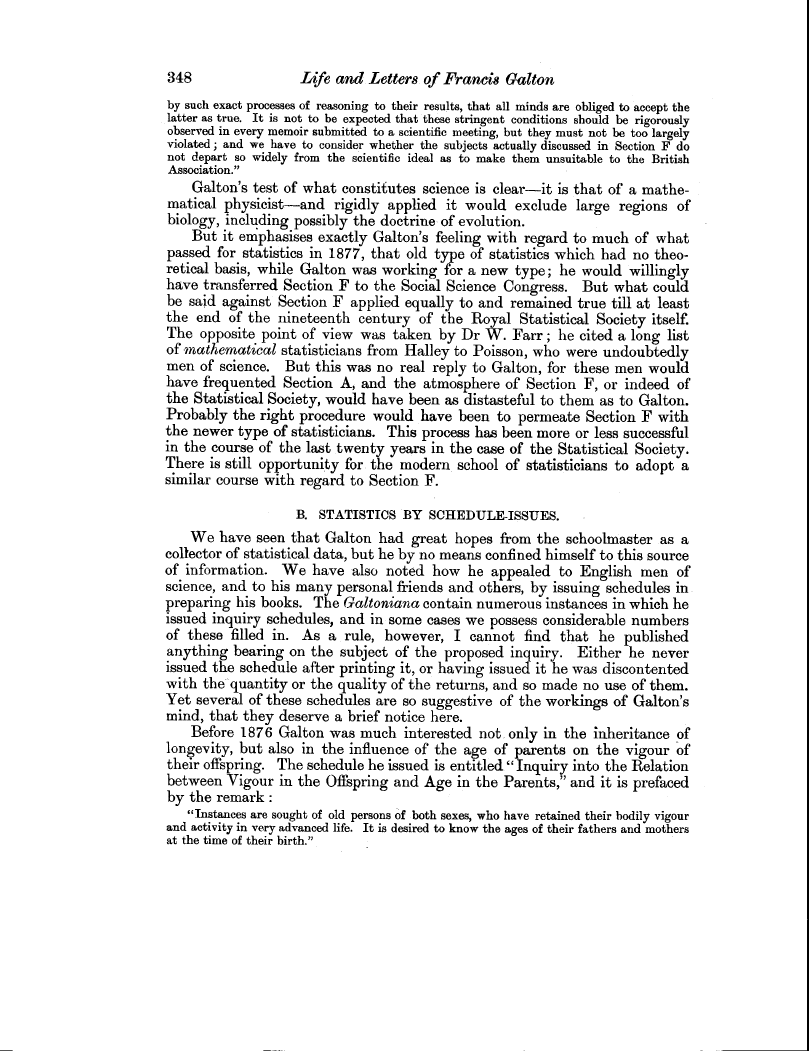348 Life and Letters of Francis Galton
by such exact processes of reasoning to their results, that all minds are obliged to accept the latter as true. It is not to be expected that these stringent conditions should be rigorously observed in every memoir submitted to a scientific meeting, but they must not be too largely violated ; and we have to consider whether the subjects actually discussed in Section F do not depart so widely from the scientific ideal as to make them unsuitable to the British
Association."
Galton's test of what constitutes science is clear-it is that of a mathematical physicist-and rigidly applied it would exclude large regions of biology, including possibly the doctrine of evolution.
But it emphasises exactly Galton's feeling with regard to much of what passed for statistics in 1877, that old type of statistics which had no theoretical basis, while Galton was working for a new type; he would willingly have transferred Section F to the Social Science Congress. But what could be said against Section F applied equally to and remained true till at least the end of the nineteenth century of the Royal Statistical Society itself. The opposite point of view was taken by Dr W. Farr ; he cited a long list of mathematical statisticians from Halley to Poisson, who were undoubtedly men of science. But this was no real reply to Galton, for these men would have frequented Section A, and the atmosphere of Section F, or indeed of the Statistical Society, would have been as distasteful to them as to Galton. Probably the right procedure would have been to permeate Section F with the newer type of statisticians. This process has been more or less successful in the course of the last twenty years in the case of the Statistical Society. There is still opportunity for the modern school of statisticians to adopt a similar course with regard to Section F.
B. STATISTICS BY SCHEDULE-ISSUES.
We have seen that Galton had great hopes from the schoolmaster as a collector of statistical data, but he by no means confined himself to this source of information. We have also noted how he appealed to English men of science, and to his many personal friends and others, by issuing schedules in preparing his books. The Galtoniana contain numerous instances in which he issued inquiry schedules, and in some cases we possess considerable numbers of these filled in. As a rule, however, I cannot find that he published anything bearing on the subject of the proposed inquiry. Either he never issued the schedule after printing it, or having issued it he was discontented with the quantity or the quality of the returns, and so made no use of them. Yet several of these schedules are so suggestive of the workings of Galton's mind, that they deserve a brief notice here.
Before 18 7 6 Galton was much interested not . only in the inheritance of longevity, but also in the influence of the age of parents on the vigour of their offspring. The schedule he issued is entitled " Inquiry into the Relation between Vigour in the Offspring and Age in the Parents," and it is prefaced by the remark
"Instances are sought of old persons of both sexes, who have retained their bodily vigour and activity in very advanced life. It is desired to know the ages of their fathers and mothers at the time of their birth."

